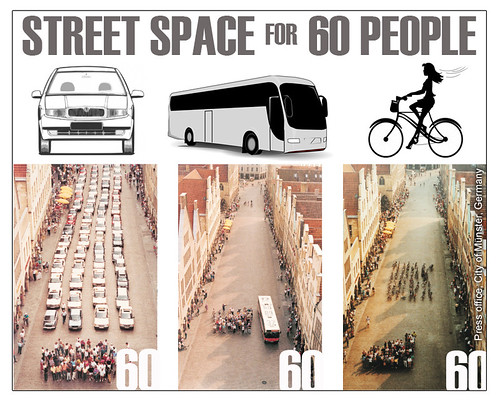underground
Senior Member
- Joined
- Jun 20, 2007
- Messages
- 2,390
- Reaction score
- 3
Just one of the many reasons no city can succeed basing itself around cars:



Just one of the many reasons no city can succeed basing itself around cars:

Omaja -- I've never said that there should not be improvements to the existing T system including some downtown. However, on a "Bank for your Buck" basis - -wether the buck is $ or your suasion of the legislature - -there are much more worthwhile trasit projects including:
1) Digging the Silver Line under D St.
2) Pedestrian link between Orange-Line platforms at DTX and State -- enabling the integration of Park, DTX, State and tieing all the lines together with some walking
3) Red / Blue connection at Charles
Those are all immenantly doable and further have a more global benefit to the system as they don't just restore some former street-running trolley branch, now seved by a bus -- they improve the reliablity and redundancy of the existing system
If you were restricting the choices to adding service -- I suggest that connecting the Green Line at Leachmere with Union Square in Sommerville and extending the Blue Line to Lynn would be ahead of A-Line restoration -- specifically because they don't involve running trolleys in the street.
Whigh ... The vast majority of what you write has approximately nothing to do with the A line or restoration thereof.
I was doing some research at work today for something unrelated to this, but I came across commuting data by zip code-- even with the public transit access that Allston has, commuting alone by car is still the #1 choice for commuters.
In Brookline the same thing was true.
If you were restricting the choices to adding service -- I suggest that connecting the Green Line at Leachmere with Union Square in Sommerville and extending the Blue Line to Lynn would be ahead of A-Line restoration -- specifically because they don't involve running trolleys in the street.
I was doing some research at work today for something unrelated to this, but I came across commuting data by zip code-- even with the public transit access that Allston has, commuting alone by car is still the #1 choice for commuters.
In Brookline the same thing was true.
Are you saying that those zips are choosing cars over public transit? Because it seems to me that a lot of them can't really choose since there's no or spotty public transit options. I mean, statistics also show that the vast majority of people choose to live on Earth and not the Moon.
According to the 2010 ACS, looking at the Census tracts around the "B" line I find 12,004 public transportation users compared to 7,925 single-occupancy drivers.
It does seem that many people seem to have more hostility towards cars than is warranted. Even Jane Jacobs pointed out something along the lines of 'the car is not the enemy." The better our mass transit system is, the better it is to drive around the city. If transit advocates can get that message across better, as opposed to the "cars suck, buses and bikes are teh awesome!" message, I think we can get more people on board.
That is true -- do you know offhand if ACS counts "trip to school" the same as "trip to work"? I can't find any quick answer on the website.
I think that's a little overblown. The viewpoints get a little polarized here by a few posters that go all-or-nothing on car vs. transit. Some on honest enthusiasm, some on thread pollution grounds (and lately, a whole lot of the latter). Fact is it's never that simple, there is never a one-size-fits-all solution, and city streets are very much multi-modal by nature. This debate gets obscured by the annoying tendency these days to dumb everything down into two opposing sides where one must "win" and one must "lose" with the winner doing some gloating postgame celebration. It's one of the worst tendencies of this political environment, but it is unfortunately pervasive and warps debate right down to this level.
Agreed-- I am by no means anti-transit, it's got a time and a place in places where space is at a premium, but anywhere that's been developed since about 1925 is car centered and needs to have reasonable access to areas built before 1925.
